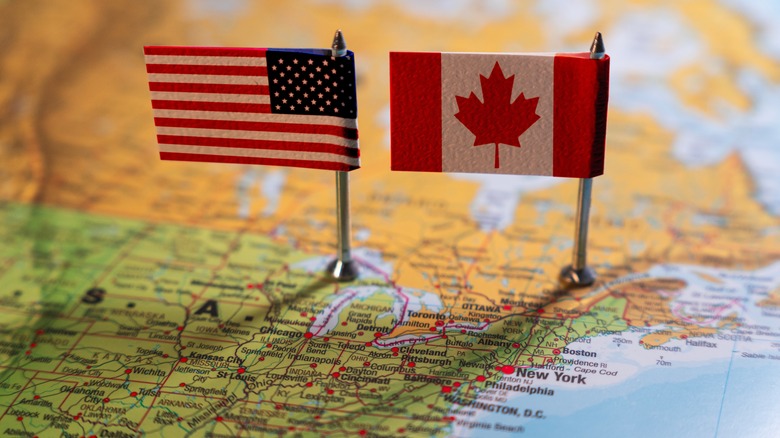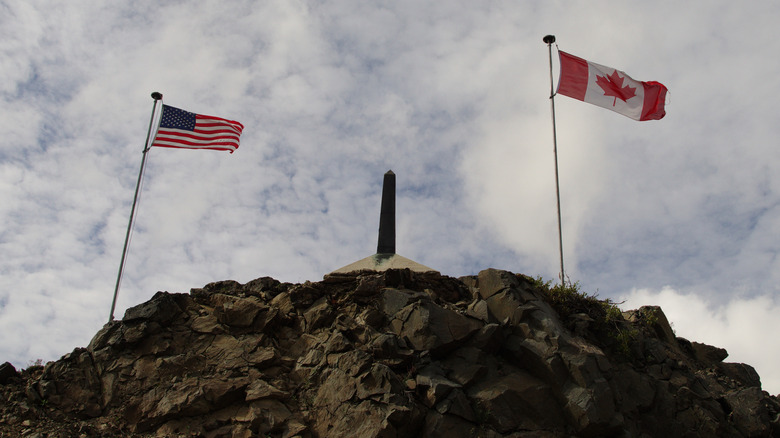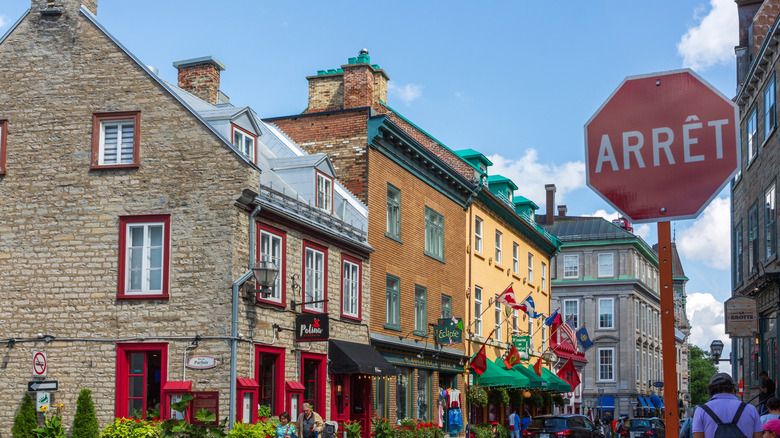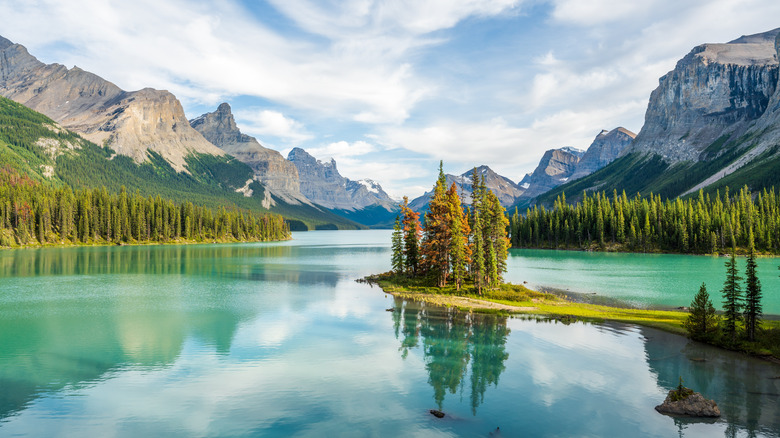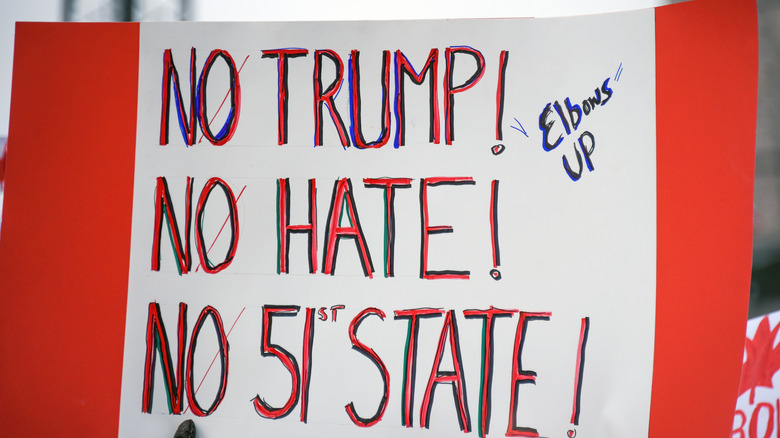Why Canada Has Never Joined The United States
Despite Canada running directly along the United States' entire northern border, how much do Americans really know about one of their next-door neighbors? Knowledge of Canada is often limited to stereotypes: politeness, hockey, moose, woods, mounties, maple syrup, poutine (cheesy gravy fries), Hollywood Ryans like Gosling and Reynolds, and that one part where people speak French.
But what about Canada's national identity and its relationship with the U.S.? Well, Canada never had a violent revolution. It demurely legislated its way to independence from the British Crown in 1867 with the British North America Act. Before and after then, it was hotly contested territory that couldn't help but get roped into the happenings of its burly, restless neighbor to the south. That neighbor, the U.S., set its eye on Canada and actually invaded in 1812. And while some Quebecois wanted to join America in the mid-1800s, that sentiment has long-since died.
Knowing this background, it might seem silly to ask, "Why hasn't Canada ever joined the United States?" Because it doesn't want to — it wants self-sovereignty, like any country and its people. It was also never compelled to join via military force or otherwise. Why hasn't Costa Rica become a Rwandan territory? Why doesn't New Zealand just admit it's not a real country and hook up with Australia? And on a more serious note: Why doesn't Taiwan or Hong Kong rejoin China or Ukraine toss away its guns and fuse with Russia? It's like that. Such reasoning hasn't stopped discussions of Canada joining the United States, though — not for about 250 years.
Early U.S. designs on making Canada a state
Discussions about making Canada a state started before it was its own independent country. In 1777, right in the middle of the American Revolution (1775 to 1783), the Continental Congress called out Canada as part of the future United States. As the National Archives quotes the Articles of Confederation, "Canada acceding to this confederation, and joining in the measures of the united states, shall be admitted into, and entitled to all the advantages of this union: but no other colony shall be admitted into the same, unless such admission be agreed to by nine states." That's nine out the original 13, mind you.
But at that point, those original colonies took "Canada" to mean "Quebec." Quebec, however, was Catholic and not Protestant like New England. They also largely spoke French and not English. And, under the Quebec Act of 1774, Canadians had already gained a degree of self-autonomy, including religious and economic freedom. Most Canadian trade also funneled through Britain and its global maritime trade network. In other words, there wasn't a big push for Canada to break away from such comforts and join the new United States.
But the American Continental Army tried to make it happen, anyway. In August 1775, General George Washington and Colonel Benedict Arnold (yes, the future traitor) led a meager 1,100 troops to conquer Canada as their own in the Quebec Campaign. British forces arrived to support Quebec City, and by May 1776, the American invasion failed.
Invasions of Canada amidst limited support for joining the U.S.
Believe it or not, the U.S. invaded Canada numerous times in the 1800s for various reasons. In 1812, the American military entered Canada — then still a British territory — hoping to leverage it in their ongoing U.S.-Britain maritime conflict. During the U.S. Civil War (1861 to 1865), there was talk of annexing Canada, but the discussions didn't go anywhere. Then, in 1866, a group of 1,500 armed Irish-Americans entered Canada to use it as a bargaining chip in Ireland's vie for freedom from England. This happened again in 1870 and 1871. None of these attempts at forced statehood amounted to anything, and they likely did little but dissuade Canadians from joining the U.S.
At the same time, there were some few Canadians who did want to join the United States. In the 1840s, some conservative Canadians wanted to join America because they thought it meant greater political freedom. The same thing happened in 1850 out of a desire to pull away from French influence.
Petitions circulated in British Columbia about joining the U.S. before the colony became Canada's sixth province in 1871. Secretary of State William Seward, the person who procured the purchase of Alaska from Russia in 1867 for $7.2 million, tried to take advantage of such pro-American sentiment by tying the North American seaboard together with a trade agreement that could have led to British Columbian statehood. This agreement would have economically linked Alaska to British Columbia, Washington, Oregon, and California, but there wasn't enough Canadian support to push it through.
The overwhelming difficulties of Canada joining the U.S.
Since British Columbia joined Canada in 1871, there haven't been any serious efforts to make the country join the U.S. There also hasn't been a lot of support to join the U.S. from within Canada besides scattered political parties. Newfoundland's Economic Union Party, Saskatchewan's Unionest Party, and Quebec's Parti 51 all advocated joining the U.S. in the 1950s, '80s, and '80s, respectively. None of their efforts went anywhere, and they had little public support.
But the efforts of those political parties point to a pertinent question. Note that attempts at forced or voluntary Canadian statehood have always focused on a specific province, like Quebec, British Columbia, Newfoundland, Saskatchewan, etc. Currently, Canada has 10 provinces, with the Inuit-dominated Nunavut being the most recent addition in 1999. And sometimes, like in the case of the 1775 invasion of Quebec, Americans took Quebec to mean Canada as a whole.
So realistically, what does it even mean to suggest that "Canada" become a state? Are we talking about the whole thing? Is the intent to glue all the provinces together and mash them into one mega-state despite all of their various legislations, populations, histories, and languages like French and Inuit? Or do we mean adding each province independently to the U.S. so that the country gains 10 more states? It only takes very simple questions like this to demonstrate how ridiculously complex is the practical, ground-level path to Canadian statehood.
The current Canadian opinion on joining the U.S.
Nowadays, the question of Canada becoming a state — or 10 states, like we mentioned — has entered the public sphere thanks to comments by President Donald Trump. Amidst tariff wars and political tensions with global neighbors near and far, Trump has called Canada the "51st state" and former Canadian Prime Minister Justin Trudeau "Governor Trudeau." In response, ABC News quotes Trudeau as saying, "What he wants is to see a total collapse of the Canadian economy because that'll make it easier to annex us." In a similarly overblown fashion, NBC News talks about Trump's "quest to conquer Canada." Thankfully, the Calgary Herald has far more realistically called such rhetoric a "hoax" deployed in political boxing matches.
But how do everyday Canadians feel about joining the United States, with all the countries' mutual history behind them? Do any Canadians want to disrupt the status quo of their lives? Do any of them want to get tangled in geopolitical games? What about changes to pensions, healthcare, public services, and so forth? While it's not possible to ask every single one of Canada's 41 million inhabitants (per the 2021 census) what they think, a 2025 Ipsos poll found that 30% of Canadians polled would join the U.S. if they were granted full U.S. citizenship and had all their assets converted into USD. And if Quebec or Alberta left Canada, 22% said that they would want to join the U.S. But for now, such figures merely represent the most recent statements in an ongoing, 250-year-old discussion.
